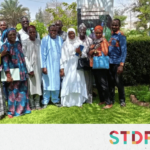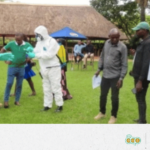FOCUS: SIERRA LEONE
- 20/12/2018
- Posted by: Gaetan Dermien
- Category: Uncategorized
Collective intelligence is one of the main principles guiding COLEACP’s actions. The association is committed to a continuous improvement process with its members, placing people at the centre to facilitate learning and performance. At the same time, COLEACP encourages and facilitates partnerships wherever possible to serve the competitiveness and sustainability of agricultural sectors. COLEACP’s action in Sierra Leone is a recent, concrete illustration of this approach.
In May 2018, COLEACP and three European importers of fruit and vegetables (Belgian, French and English) were invited to participate in a first exploratory mission to Sierra Leone, organized by Brussels Airlines Cargo. The objective was to analyse the potential for adapting current production to the growing needs of the European market for a wide range of fresh vegetables (such as leaf vegetables, peppers, okra and eggplant). Brussels Airlines Cargo aims both to increase the loads of its cargo spaces on return routes, and to participate in the development of a competitive horticultural sector in Sierra Leone.
The mission enabled COLEACP, as part of its Fit For Market programme, to identify the best way to support exporting companies in complying with EU regulatory and trade requirements in line with the needs of interested importers, and to analyse the specific needs of local markets. It also enabled the delegates to meet representatives of the services of the Ministry of Trade and the Ministry of Agriculture, and to inform them of developments in European phytosanitary regulations and the exporter registration system (REX).
The communications between the various stakeholders in the private and public sectors since the May visit have contributed to planning for a national action plan for the development of the fruit and vegetable sector from early 2019, based on both local and international market access.
In the field, COLEACP has already received eight requests for support from exporting companies, producer cooperatives and service providers, as well as an official request from the Sierra Leone Ministry of Agriculture for capacity building in SPS control and certification. Capacity-building activities within enterprises have begun with the training of several technical managers in the basic principles of integrated crop protection. At the same time, a local expert was supervised by a regional trainer in order to strengthen his field of expertise. In January 2019, Sierra Leonean inspectors in charge of phytosanitary controls will receive regional training organized by COLEACP in Senegal.
In terms of partnerships, bridges are being considered with the World Bank’s Sierra Leone Agro-Processing Competitiveness Project, and with the European Union as part of its future interventions in horticultural diversification.

![EU and GB approval changes (January-March 2025) 9-FFM+-[ENG]](https://news.colead.link/wp-content/uploads/2024/06/9-FFM-ENG-150x150.jpg)


